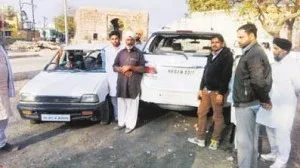 |
| Sikh farmers from Loria village |
A small town in Kutch district, Loria, is once again in news more than a year after the local Sikhs settlers were attacked by powerful persons in the region in October 2013. Sikh farmers from the village have complained to their brethren in Bhatinda district in Punjab that political activists associated the ruling BJP of district Bhuj have “attacked” them. Punjab media, quoting Loria farmers, said, farmer Jagjeet Singh was “injured” though “others managed to save their lives with difficulty”. The attackers destroyed the two cars.
The attack took place, said the reports, after two farmer brothers, Jaswinder Singh and Harwinder Singh, originating from village Pitho of Bathinda district, found that a Gujarat government had ordered survey of their land in Loria. They went to see what was happening and why their land was being surveyed. When they were about to return, a local BJP leader and former sarpanch of the village “attacked them with a crowd.”
Quoting the two farmers, Angrej Singh reportedly told mediapersons in Bhatinda that “the culprits broke the rear glass of his car and also the glasses of a Maruti car.” Amandeep Singh of Kotakpura added the Bhuj Police “did not provide them security despite a written request.” The survey was allegedly being carried out with the intention of “acquiring” their agriculture land.
A Bhatinda datelined story said, “According to collected information, the Gujarat government has allotted the work of computerization of agriculture land to a private firm”, adding, “It is noteworthy that Sikh farmers and other minorities are being targeted in Gujarat from the day the BJP under leadership of Narendra Modi started ruling Gujarat.”
Yet another report blamed the land mafia in Kutch desert for trying to “scare” and “take the land over from the Sikh farmers settled there”, adding “The local farmers have said the police and government officials are not providing them any security and they feel insecure.”
A month ago, according to reports, people in the village had stopped the agency officials from demarcating land belonging to the Sikh farmers. The district revenue authorities and the police again sent the agency officials to accomplish demarcation, which became the reason for the protest by Sikh farmers, and violent retaliation.
Sikh farmers from the village say, after 440 acres of land were allotted to Sikhs 300 acres have already been taken over by the government and small chunks of land are being fraudulently registered on names of local people.
Meanwhile, the matter is already taking a political turn in Punjab, with former Chief Minister and senior Congress leader, Rajinder Kaur Bhattal saying it was “unfortunate and shameful on the part of Modi government at centre and BJP government in Gujarat for failing to tackle the situation regarding frequent attack being carried on Sikh farmers in villages in and around Bhuj region.”
“The farmers settled in the Bhuj region for more than six decades had been living under constant fear from land mafia which seems to have patronage from BJP in Gujarat. Sikh farmers have made repeated requests to state government and Modi government at centre to ensure security for them adding that it has fallen on deaf ears”, she said.
In October 2013, four Sikh farmers were injured by 30 armed men in Loria village, situated 15 km from Bhuj, district headquarters of Kutch district. In a complaint with the police, the Sikhs named the then Anjar BJP legislator Vasanbhai Ahir as the perpetrator. "On October 3, a group from Loria questioned our ownership of the land. We showed them the papers, and after satisfying them, started sowing rindi (oil seeds)," media reports quoted Amandeep Singh as saying.”

Comments